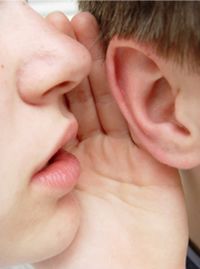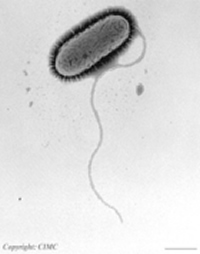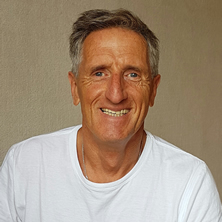Bacteria Whispering
Do you ever talk to yourself?
You may be surprised that talking to yourself is actually a good thing.
 Working with your bacteria can be a lifesaver, and staying focussed on good health goals really can, and does, help you to stay well. "What we can or cannot do, what we consider possible
or impossible, is rarely a function of our true capability." ~Anthony Robbins
Working with your bacteria can be a lifesaver, and staying focussed on good health goals really can, and does, help you to stay well. "What we can or cannot do, what we consider possible
or impossible, is rarely a function of our true capability." ~Anthony Robbins
What if's?
What would you do if you found out your ability to fight disease was 'predominantly' under your control. Reading this may shed some light on why positive thought and behaviour can contribute to, halt, and even reverse the development of many diseases.
At any given moment the human body is inhabited by trillions of bacteria, about a kilo of them (one trillion) live just in your gut and over 400 species are living happily in your mouth. These bacteria have been merrily evolving inside us for hundreds of millions of years, and they have learned a few tricks about how to work our internal systems for their own benefit.
 We're going to take a look at how smart bacteria are, what we know about them, then consider
how to work with them in sickness and preferably, in health. When you learn a bit more about them you will know it's got to be way better to have them on your side or at least be able to talk to
them. http://www.youtube.com/watch?v=gEwzDydciWc
We're going to take a look at how smart bacteria are, what we know about them, then consider
how to work with them in sickness and preferably, in health. When you learn a bit more about them you will know it's got to be way better to have them on your side or at least be able to talk to
them. http://www.youtube.com/watch?v=gEwzDydciWc
How smart are bacteria and, what do we know about them?
In the 1970's scientific opinion was that the sole ambition of a bacterium was to produce two bacteria. The idea that bacteria could form functional groups was a science fantasy. Today, we know bacteria talk to each other using systems similar to pheromones called autoinducers".
We know bacteria form armies that release nasty toxins to overcome our defences, and that they produce "weaponised" antibiotics to kill competing bacteria. They also have a communication technique known as "quorum sensing" that lets them mass communicate with each other to enhance bacterial mating, mixing in new DNA increasing potency and the chance of bacterial survival.
 The Warriors within.
The Warriors within.
Bacteria also can and do build complete structures within you called "biofilms" they actually create miniature fortresses against drugs and our immune systems assaults. These are very like the ancient Roman soldiers defence of a phalanx, with bacteria hiding away underneath as the useless arrows fall, ready to come out and attack again as soon as the arrows / antibiotics stop. This is why some urinary tract infections and hospital super bugs are so hard to eradicate.
Soldiers on the move.
Most bacteria move by 'swimming' using "flagella" (small fans) some video is here: http://www.youtube.com/watch?v=2P9hvlsF9_c Under a microscope they look much like soldiers dodging sniper fire as they swim they, stop, tumble around re-orient and swim on.
However, when attacked they "chemotax" away from the attack by fanning themselves along for much longer periods. Then they tumble, roll and check they are actually moving away from the threat, and fan themselves along even more. These fanning movements are what your immune system "sees" when we are under attack and all these phenomena have attracted microbiologists to develop therapeutic agents to break up biofilms, and work on disrupting their attack, defence and communication systems by using chemical misinformation, or good old propaganda.
 These fabulous new technologies are on the right track, but in my view they are just playing
catch up with mother nature.
These fabulous new technologies are on the right track, but in my view they are just playing
catch up with mother nature.
Communicating with the world within.
Inadvertently we tell our bacteria everything we do. For example: there's some food on the way down, or damn somebody just sneezed next to me. All day, every day, we tell our bugs who or what we think may be attacking us, and then whether we think we can win the war.
Inside our body bacteria form complete eco-systems all governed by the same principles of ecology and evolution as our whole planet. Just like the planet when this balance is upset this shifts balance of power, often not to our advantage.
For example one bacterium Clostridium difficile is normally controlled by other bacteria, if it isn't it can overgrow and cause potentially fatal damage to the lining of the colon. Broad spectrum antibiotics essentially clear fell our own internal rain forests. Killing both good and bad bacteria, add in a bad diet and the behaviour of normal bacterial flora is disrupted. This sets us up with huge natural imbalances. Creating inside us a survival of the fittest war in what is now a polluted sewer. Sadly it tends to be the bad guys that survive best in a sewer, because it's where they came from in the first place.
 The NEW Laptop.
The NEW Laptop.
At birth the gut in a human foetus is nearly sterile, immediately the newborn is invaded by swarms of bacteria. Many view this like "war of the worlds" with good and bad microbes fighting a life and death struggle for supremacy. It's actually not like that and it's helpful to look at what's actually happening when that newborn arrives like a brand new laptop with all its hardware intact and screaming out for the latest learning software.
 A pioneer in symbiotic development Lynn Margulis puts it this way, "We live on a bacterial
planet and it's the long-term physical association between members of different types of species that leads to specialization," "This interaction is 'the' major source of evolutionary change".
Interaction is the main source of change.
A pioneer in symbiotic development Lynn Margulis puts it this way, "We live on a bacterial
planet and it's the long-term physical association between members of different types of species that leads to specialization," "This interaction is 'the' major source of evolutionary change".
Interaction is the main source of change.
We developed into us because we have been pushed into it by the many other species we interact with. The last thing we don't need to do is provide our bacteria with bad habits because, they are evolving faster than we are, and we want them to grow in the right directions to help with our survival.
It's not what you don't know that's the problem, it's what you don't know, that you don't know.
I believe our bacteria attack because they 'know' we're low, and they feel they have a good chance succeed. This is why you get the flu as soon as you go on leave. You told them with minute chemical signals I'm relaxed, got some time off to deal with this fight come get me now, so they did just that. Modern medicine is just starting to come to grips with understanding why things like the 'placebo effect' can attain scientifically impossible results.
 Just like Santa, your bacteria know if you've been bad or good. They know when you see a
bakery smell a coffee, even if you feel a bit depressed. In our symbiotic dance with them they feed back to our nervous system their own demands as well, it's all about biochemistry.
Just like Santa, your bacteria know if you've been bad or good. They know when you see a
bakery smell a coffee, even if you feel a bit depressed. In our symbiotic dance with them they feed back to our nervous system their own demands as well, it's all about biochemistry.
So, when you do see a bakery the data is fed to the guts enteric nervous system, it tells the stomach, a flood of chemistry begins and your bacteria get ready for a feast. If, you walk on past because you're not actually hungry, you may notice a few billion bacteria begin rioting, creating hunger pangs because they anticipated a feed of the sweet stuff that they need to grow, and they are now throwing a tantrum.
Now is knowing that bacteria communicate the Achilles' heel of bacteria? Well maybe. Currently a lot of the smart money in biotech is being aimed at this subject. We know a lot more about the how bacterial communities form and how they communicate. There are scientists who work in population and ecology helping us to find out what drives bacterial "group behaviour", so we can develop drugs to control bad group behaviour.
 It's urgent work because bacteria are getting smarter fast, and the behaviour of microbial
groups can influence disease. The US centre for disease control and prevention estimated 2 million people acquired infection in a US hospital in 2006 and 90,000 died from that infection.
Biofilms that contaminate medical and dental devices contribute to disease. It's been estimated that biofilms account for two-thirds of the bacterial infections that physicians encounter.
It's urgent work because bacteria are getting smarter fast, and the behaviour of microbial
groups can influence disease. The US centre for disease control and prevention estimated 2 million people acquired infection in a US hospital in 2006 and 90,000 died from that infection.
Biofilms that contaminate medical and dental devices contribute to disease. It's been estimated that biofilms account for two-thirds of the bacterial infections that physicians encounter.
What if you can help your system to help itself?
One of the most puzzling facts in medicine is the Placebo effect. Trials for anti-depressants such as Prosac have concluded that the expectation of improvement, not adjustments in brain chemistry, accounted for 75 percent of the drugs' effectiveness, the critical factor is our beliefs about what's going to happen to us. Analysis of nearly 20 years of clinical trials of depressed patients treated with drugs, psychotherapy, or a combination of both it's been found that 50 percent of the drug effect is due to the placebo response. Your sensory experiences and thoughts do affect your neurochemistry and the body's own neurochemical system. This affects other bio-chemical systems, including the hormonal and immune systems. Therefore what you expect your health to be, is very important to your physical wellbeing and recovery from injury or illness.
We believe the placebo effect is simple a demonstration of new behaviour in bacteria being affected by our belief in the treatment. Change our attitudes and you can reasonably expect to change your illness, or avoid a new one. Start 'whispering' to your bacteria "not clubbing them into submission", build some understanding and enjoy a harmonious relationship. We are smart we humans, history shows us that by domesticating and working synergistically with any creatures their lives and ours can be improved, bacteria are no different. As global temperatures rise bacterial growth will be stimulated. It's imperative we learn to communicate with, assist, and direct our bacterial populations.
By understanding and using misinformation as the first weapon of choice, we can create environments where our bacteria will not attack, simply because they believe the attack is doomed to failure from the start.
And, because the 'behaviour' of a "sick" person is learned (that is you copy the sick people you have seen) and because role-playing illness is socially and culturally acceptable, our belief is you tell your bacteria you are venerable and ready for a successful attack to commence, so they do. Don't buy into it!
Tune all your minds big and small to your new reality and you will most likely stay that way. In our personal health management, the power of positive thinking is not mind over matter, it is a big mind over lots of smaller minds working in teams. Try being a better boss, a better provider, and a better manager, and you will get better results and enjoy much better health.

Chris Toal
Managing Director Wellness at Work Ltd.

Blog Post by Chris Toal
Added 24-Jan-2015
More Blog Posts
- Stretch Your Hamstrings, Save Your
- Cold water, healing or harm?
- Personal Training
- Alla Kalinina's one off hand embroidered designs
- Presentation & training at Massage NZ
- Facing up to your emotions!
- Who is going to pay your bills?
- Understanding your intuition
- Understanding our treatment methods
- Stop cooking yourself!
- Bacteria whispering
- Pet massage for our furry friends
- Tinnitus; the bells are ringing!
- The real cost of OOS
- Doing your own 'Haka' for health!
It all starts with 90 minutes that could change your life!
With our exclusive BodyAudit© we both find out what is really wrong with you, so finally you can get started on your journey back to health.
Our Team

Chris Toal
A passionate Forensic Bodyworker for two decades, Chris says that he's only a facilitator of communication between you and your body. He believes that many persistent unresolved injuries and conditions are only waiting for...
more
Alla Kalinina
Alla has a deep base to draw on. A renowned dance choreographer and fitness instructor in her homeland, Ukraine, her Aerobic dance teams were European champions. Alla is also a qualified mobility therapist...
moreLike a free info pack?
We would really love to help. No change No charge!
Provide us with a quick outline of your health issues and we will send you relevant info and references from others that have been where you are and are now well. Stop struggling; this is not living - you are supposed to be clear headed and happy.